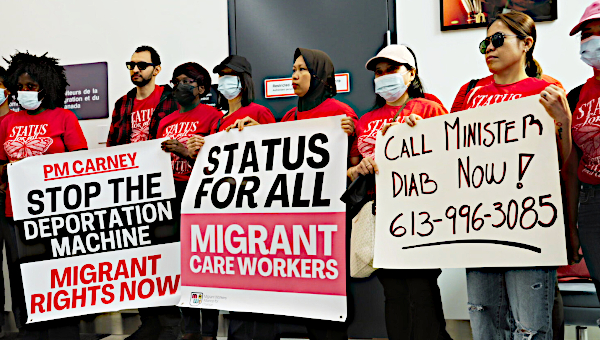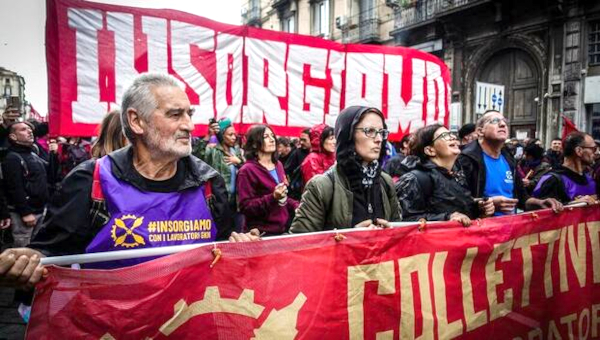Fighting Austerity? The Public Sector and the Common Front in Quebec
The previous round of negotiations in Quebec between the rightwing provincial Liberal government of Jean Charest and the public sector unions in 2005 was ended abruptly by the adoption of a special law that unilaterally imposed wages and conditions on the workers, while providing draconian penalties for any disturbance to the normal functioning of public institutions. The special decree (Bill 142/Law C-43) was quite a remarkable attack on public sector collective bargaining, even by the standards of the Quebec state.
 As a result, according to the unions, the workers suffered 4 per cent decline in real wages over the five-year period of the imposed contract. Further, in the estimate of a government agency set up to monitor the relationship between public and private sector wages in Quebec in order to facilitate public-sector negotiations, the wages of provincial workers had already fallen 8.7 per cent behind those of the private sector by 2004. The government, however, now argued that public sector workers enjoy the advantage of job security compared to private sector workers (which is the case for at most three quarters of public sector workers).
As a result, according to the unions, the workers suffered 4 per cent decline in real wages over the five-year period of the imposed contract. Further, in the estimate of a government agency set up to monitor the relationship between public and private sector wages in Quebec in order to facilitate public-sector negotiations, the wages of provincial workers had already fallen 8.7 per cent behind those of the private sector by 2004. The government, however, now argued that public sector workers enjoy the advantage of job security compared to private sector workers (which is the case for at most three quarters of public sector workers).
A Common Front Forms
In May 2009, the CSN (Confédération des syndicats nationaux – Confederation of National Trade Unions), the FTQ (Fédération des travailleurs et travailleuses du Québec – Federation of Workers of Quebec, affiliated with the CLC) and the SISP (Secrétariat intersyndical des services publics – Inter-union Secretariat of Public Services – most nurses, school teachers, professionals and others) announced a ‘Common Front’ (Front commun) of provincial public-sector workers (recalling in name the illegal general strikes of Quebec workers in 1972).
In numerical terms, this was the biggest Common Front ever, representing 475,000 workers (of some 555,000 provincial public sector workers in Quebec). It was made possible by an agreement to abstain from raiding each others’ unions over the summer (the annual raiding period in Quebec). The main common demand was an 11.5 per cent raise over the course of a three-year agreement. This would allow the workers to make up for the 4 per cent lost during the last contract as well as some modest, new gains. Apart from the common front, the unions also negotiate sectoral agreements.
In launching the Common Front, the leaders announced that their goal was to reach an agreement before the current contract ended on March 31, 2010. This clearly implied that leadership did not intend to mobilize with a view to building a favourable correlation of forces, since any strike pressure could be legally applied only after that date. And, in fact, there was no serious mobilization. When the Quebec government began negotiating, even though its initial ‘final offer’ was light years from what the unions were asking, this was presented by the union leaders as a victory.
Abstention from Coalitions against Public Sector Austerity
This ‘strategy’ was, to say the least, surprising, given that this government had abruptly ended the previous negotiations with a special law that it did not even try to justify seriously. In 2005, there were no economic crisis, nor budget or debt crises. The Common Front leaders did little to inform the public of their demands or to present what was at stake as quality public services. This was the case even though they were bargaining with an extremely unpopular government that was facing serious accusations of corruption and was bent on a course of creeping privatization of public services and introducing or raising fees for these services.
The Common Front leaders also abstained from participation in a broad coalition of social forces that was organized in opposition to the government austerity Budget of March 30, 2010. The Budget called, among other things, for introducing a $25 fee per visit to doctors, a $200 annual ‘health tax’ regardless of income, a 17% rise in electricity rates over 2014-2018 beyond the usual annual increases, and a 2% increase in the provincial sales tax. These regressive measures were extremely and broadly unpopular across Quebec. But the refusal of the Common Front leaders to join the coalition (although many local unions did) only helped to undermine whatever public support there was for the front, since the wage demands, if granted, would appear to be at the expense of the worst-paid workers.
The Accord and Public Sector Worker Setbacks
The agreement with the Quebec government signed by the Common Front leaders on June 27 was very far from their initial demands. The unions were asking 11.5 per cent over three years. The agreement is for five years and gives between 7 per cent and 10.5 per cent over that period. The higher figure depends on whether GDP grows faster than expected. In that case, the workers will get 0.5 per cent, 1.5 per cent and 1.5 per cent more in the last three years. The agreement not only gives up the goal of recouping the lost wages of 2005-10 but it accepts a further decline, since inflation over 1.2 per cent annually will be compensated by only 1 per cent more for the entire five years. As for the additional 3.5 per cent if GDP grows faster than expected, that is quite hypothetical in current circumstances.
The accord was signed and presented as a victory by the union leadership without sounding out the rank and file. It still has to be ratified by the local-union assemblies, but a significant revolt seems unlikely, given the weakness of left wing currents in a union movement in Quebec that has increasingly embraced the corporatism of ‘social partnership’ and social investment funds over the past 30 years.
Despite the ‘common front,’ the conclusion of the agreement means the abandonment by the Common Front of the 55,000 nurses of the FIQ (La Fédération interprofessionnelle de la santé du Québec – Federation of Nurses of Quebec), who have not signed their sectoral agreement. Their main demands concern workloads (vast amounts of overtime) and the widespread use of agency labour. In a way, the Common Front experience of 2010 repeats the earlier failure of the big federations to support the nurses in the summer of 1999 when, in defiance of their own leaders and in the face of extremely punitive laws, they struck, with much public support, for two weeks. The federations reaped the bitter fruits of their inaction when in 2005 they saw their own union rights trampled underfoot by similarly repressive laws.
The Leaders of the Common Front Have Betrayed Us
Dominique Boivin
I am shocked and outraged and feel betrayed in the wake of the agreement in principle on wages reached on June 24th between, on the one hand, the three leaders of the Common Front – FTQ president Michel Arsenault, CSN president Claudette Carbonneau and SISP spokesperson Réjean Parent – and, on the other, the premier and the head of the Treasury Board.
The agreement in principle was reached after only two meetings between the top-level representatives of the trade-union movement and government. The first meeting took place on the evening of June 22nd and lasted two hours. The second and final meeting was a conference call that lasted barely an hour early in the evening of June 24th. It was during this short one-hour discussion – and over the phone if you can believe it – that our representatives received and accepted the government’s “comprehensive final offer.” This only makes me feel even more betrayed!
Whereas:
• According to a Canadian Press wire report of June 6, 2009, the Common Front of trade-union leaders had declared the previous day that “Catch-up wage increases for government employees will be at the heart of the next round of collective bargaining.”
• This wire story was published following “an initial meeting between the trade-union leaders and those in charge of the Quebec government’s purse strings.” In it, Arsenault says that “wages are a priority issue.” He declares that “the wages of government employees have fallen behind those of the majority of Quebeckers and those of unionized [private-sector] workers. So there is some catching up to do.”
• On December 2, 2009, a piece on the Common Front website estimated that “our wages have not kept up with inflation in recent years. […] Our purchasing power has deteriorated. We have to put a halt to the deterioration in wages. […] We therefore demand wage increases of two per cent per year from 2010 to 2012 in order to protect our purchasing power. That comes to six per cent over three years.”
• Since 1982, the Institut de la statistique du Québec tells us that our wages have fallen behind increases in the Consumer Price Index (CPI) by at least 30 per cent, whichever method of calculation is used. Indeed, the Institut demonstrates that this tendency is now chronic; not only did we lose 20 per cent of our wages in 1982, we received increases (!) of zero per cent in 1998 and 1999, one per cent in 2000 and 2001, 1.5 per cent in 2002, zero per cent again from 2003 to 2005, and then two per cent from 2006 to 2009. On average, that means annual wage increases of a miserly 0.96 per cent during this 12-year period. Given that the average annual rise in the CPI was two per cent over the same time, this means real wages have actually dropped by 10.5 per cent.
• The Common Front has also pointed out that “for comparable jobs, the wages of government employees have fallen 8.7 per cent behind other Quebec workers. Compared to unionized private-sector workers, the figure is 12.4 per cent.” Compared to other public-sector workers, the gap is even bigger: 14 per cent behind the federal civil service; 21.3 per cent behind Crown corporations; and 24.7 per cent behind municipal workers.
• So it was entirely reasonable for the “Common Front to propose moves toward catching up with the private sector through an annual average increase of 49 cents per hour – that is, 1.75 per cent of the average wage for a total increase of 5.25 per cent over the three-year period of the collective agreement.”
• And it wasn’t surprising to see the results of a CROP poll published by the Common Front on June 7th: “96 per cent of Quebeckers want the government to provide the funds required to safeguard our public services”; and “no fewer than 82 per cent […] feel […] that it is reasonable for the Common Front to demand wage increases that enable government employees to catch up to all other workers”; and finally, “65 per cent of respondents said that the wage demands of government employees are […] reasonable.”
• The agreement in principle includes clauses providing for increases of up to 4.5 per cent if inflation is high or if the growth rate surpasses the forecasts spelled out in finance minister Raymond Bachand’s budget.
• The agreement in principle on wages sets out a total increase of six per cent – but over a period of five years rather than three. That means 1.2 per cent annually, or 0.8 per cent less than the average historic increase of the CPI (two per cent). As such, in the first year of my new contract I will only get 0.5 per cent (74 cents per day) more – in contrast to the initial Common Front demand of $5.54. During the second year, I will get $1.11 more per day, and so on. And even if all the stars were to align over the next five years – and I certainly wouldn’t bet on that happening – I would still get only a two per cent raise every year, just enough to cover the rise in the CPI.
• During a June 9th press conference, Claudette Carbonneau said that “chances are good that we will reach an agreement [on wages] before the summer holidays.” But she included the following cautionary note: “There should be no mistake; we do not want an agreement at any cost.”
• On June 23rd, the press relayed Mme Carbonneau’s words of warning: “Our members are not prepared to vote for a deterioration in their wages.” She stuck to her guns: “You can’t ask people to accept a longer agreement where they come out poorer in the end. That’s just crazy.” Réjean Parent went even further: “The premier has fully understood the limits.”
The outcome? On the evening of June 24th, in spite of all the preceding statements, trade-union demands were jettisoned in favour of a weaker government offer spread out over five years instead of three. As Pierre Mouterde wrote in Le Devoir on June 30th, our three trade-union leaders “have endorsed an agreement that is miles apart far from what had been painstakingly ratified by the union movement (11.5 per cent over three years) – and without even trying to really survey their rank and file on the merits of such a counter-proposal […].”
Accordingly, I accuse our three representatives – Arsenault, Carbonneau and Parent – of high treason against the Common Front’s 475,000 members. I accuse these leaders – whose job was to defend the wages of government employees – of having sold us out. Why did they do so, and for how much? •
Dominique Boivin is a government employee and elected representative of the Syndicat des professionels du gouvernement du Québec. An experienced negotiator, he worked as a professional lobbyist between 1975 and 1992. From: ‘J’accuse les chefs du Front commun,’ Le Devoir, 14 July 2010.
Translation from French by Nathan Rao.





